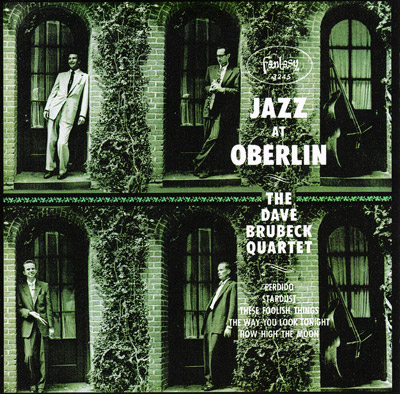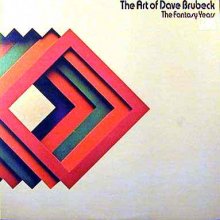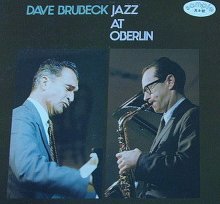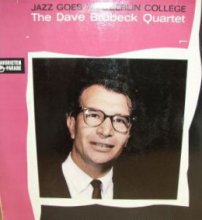
.jpg)

Jazz at Oberlin

Other Album Covers & Images
Label: Fantasy
Year: 1953
Released on LP: Yes
Released on CD: Yes
Tracks
1. These Foolish Things
2. Perdido
3. Stardust
4. The Way You Look Tonight
5. How High the Moon
Personnel
Dave Brubeck (piano)Paul Desmond (alto sax)
Ron Crotty (bass)
Lloyd Davis (drums)
Notes
Oberver (UK), Jan 2011, rated "Jazz At Oberlin" as one of the 50 great moments in Jazz - article below.
Brubeck's 1953 live album showed that jazz didn't have to follow the bebop route, and that there was even a chart audience out there for it
The pianist and composer Dave Brubeck had more than his share of Great Moments: he was the first to sell a million copies of a jazz instrumental; he was one of Time magazine's rare jazz cover subjects; he has played for presidents and popes; composed everything from classic jazz themes to symphonies; and the tune of his most famous hit, Take Five, is familiar to music lovers, from eight-year-olds to octogenarians.
Brubeck's first Great Jazz Moment is one that has been overlooked though – the making of his quartet's 1953 live album, Jazz at Oberlin. Not only did this dynamic gig reveal Brubeck's vivacious creative relationship with west coast alto saxophonist Paul Desmond to a new and youthful audience, confirming the then 29-year-old Desmond as a sensational sax improviser, it also indicated new directions for jazz that didn't slavishly mirror bebop, and even hinted at free-jazz piano techniques still years away from realisation. The significance of Jazz at Oberlin didn't stop with the music either. The enthusiasm of the college audience, audible throughout the album, marked Brubeck's eager adoption by America's (predominantly white) youth – a welcome that soon extended around the world, and brought the pianist chart hits for a rhythmically intricate instrumental jazz in a period in which the newly emerged rock'n'roll was carrying all before it.
What came to be known as Brubeck's "classic quartet" (comprising of Desmond, bassist Eugene Wright and the astonishing polyrhythmic drummer Joe Morello) was still three years away when the Oberlin concert was recorded, though drummer Ron Crotty and bassist Lloyd Davis played the show with brisk empathy. At the same time the repertoire – variations on standard songs or bop anthems – gave no hint as to Brubeck's subsequent fascination with adventurous but very catchy time-signatures like 5/4 and 9/8, not to mention his adaptations of classical forms like rondos and fugues. Oberlin did, however, open a window on the core creative relationship that would soon ignite all those elements (Take Five was a collaboration, developed by Brubeck from a Paul Desmond theme), and revealed a wealth of harmonic and rhythmic references in the leader's own playing that would change the language of jazz.
Reviews
Concord Music Group - On release of 24-BIT Remastering CD 2011
Jazz at Oberlin, recorded live at Oberlin College in Ohio in March 1953 and released later that year, is considered a breakthrough album - not just for Brubeck himself, but for the entire concept of live jazz recordings. "The idea of presenting a jazz concert on a college campus was something that really hadn't been done," says Phillips. "So this recording represents a historic first. The combination of the excitement generated by the quartet and the unbridled response from the audience is riveting."
Indeed, says jazz critic and historian Ashley Kahn in his new liner notes, "there had never been a commercial jazz recording that contained, again and again, such spontaneous eruptions of enthusiasm. That the youthful attendees were so gleefully unaware of jazz protocol - not holding on to their appreciation until the end of the solos, offering raucous applause rather than polite golf claps - only adds to the charm of the recording." More than a half century after the performance was recorded, "Brubeck's playing is still astonishing," says Kahn.
Concord - on original release
College jazz concerts have long been a commonplace, but in 1953 they were a rarity. It was the Dave Brubeck Quartet that pioneered in the genre, and this was their first on record. Oberlin, with its famous conservatory, was an appropriate setting, and the foursome came up with a program of five great jazz standards in long and often surprisingly free performances that found Dave and Paul Desmond at the top of their game. Dave's intense solo on "These Foolish Things" is one of his most inspired early improvisations, and Paul shines on "The Way You Look Tonight." Throughout, the interplay between them is fresh and often astonishing. Caught at the brink of fame, the quartet shows why it got there.
All Music Guide – review – Copyright
Although a touch underrated, Jazz at Oberlin is one of the early Dave Brubeck classic recordings. The interplay between the pianist-leader and altoist Paul Desmond on "Perdido" borders on the miraculous, and their renditions of "The Way You Look Tonight," "How High the Moon" and "Stardust" are quite memorable. Brubeck's piano playing on "These Foolish Things" is so percussive and atonal in one spot as to sound like Cecil Taylor, who would not emerge for another two years. With bassist Ron Crotty and drummer Lloyd Davis giving the Quartet quiet and steady support, Brubeck and Desmond were free to play at their most adventurous. Highly recommended.
Scott Yanow
© Rovi Corporation. All Rights Reserved


